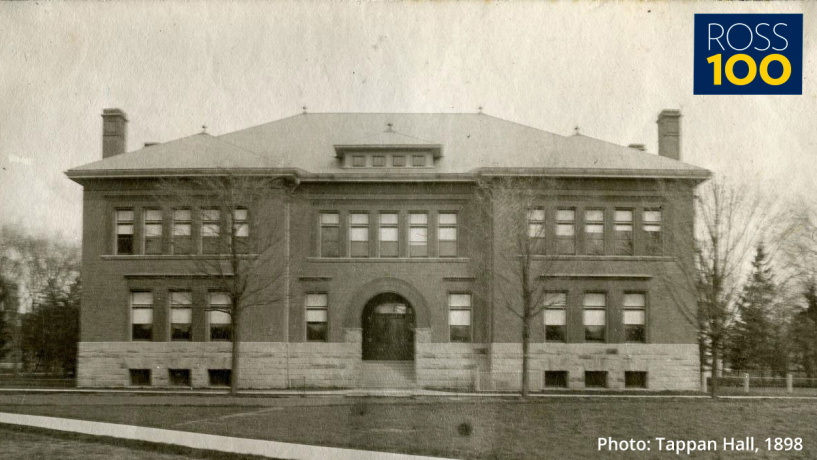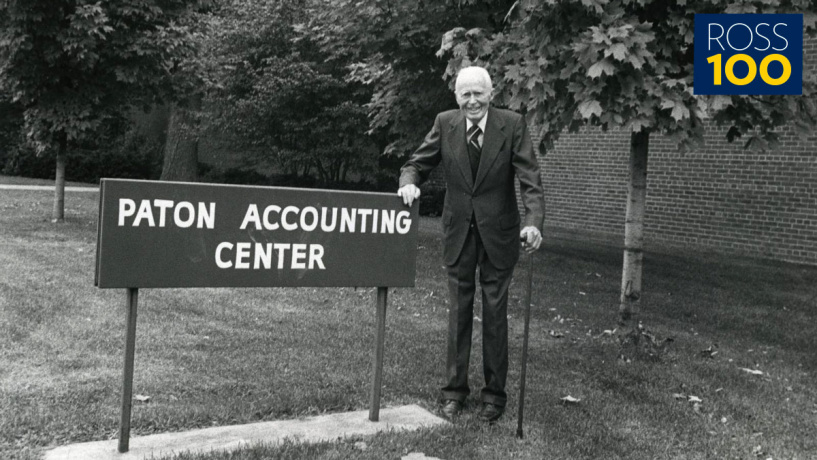Longstanding Dedication to Practical Business Research

The Ross School of Business’ current commitment to impactful and useful research dates back to the earliest days of the school.
As referenced in Tradition, Vision, and Change: Business Education at the University of Michigan, 1900-2000, Edmund Ezra Day, the founding dean of the School of Business Administration, delivered a report to the university president in 1925, a year after the school opened. He listed a few needs he saw as critical for the new school, including more faculty, a separate library, and additional classroom space. He also wrote, “A Bureau of Business Research should be established to bring the School into effective contact with outside business and to enrich the professional courses in its curriculum.”
Day didn’t waste any time implementing that part of his vision. The Bureau of Business Research was formally established in October 1925, and in January 1926 the bureau published its first original work under the title Michigan Business Studies.
Conducting research with practical value was important to Day. He wrote: “It is expected that the Bureau will be the means by which members of the staff of the School will make contacts with business concerns to the mutual advantage of business and the School. … Investigation will not be confined to any single industry or phase of business but will turn in whatever direction the importance of the problems and qualifications of the staff appear to suggest.”
The first study issued by the bureau was “The Life History of Automobiles,” by Professor of Marketing Clare E. Griffin, a leading early member of the faculty. He applied mathematical analysis to the question of how long different models of cars lasted—critical information for the young auto industry. Among the conclusions of his work:
- The mortality rate for automobiles follows a curve similar in form to that for human lives and for various types of industrial goods.
- The average life of motor vehicles generally is 7.04 years.
- The average life of Ford cars is substantially longer than the average life of all other cars as a group.
- The average length of life of automobiles has shown a definite though not a steady increase.
Other research papers published in the early days of Michigan Business Studies included “Measures of Business Conditions in Michigan” by O. W. Blackett; “Operating Statistics for the Credit and Accounts Receivable Departments of Retail Stores” by C. N. Schmalz; and “Real Estate Subdividing Activity and Population Growth in Mine Urban Areas” by E. M. Fisher. A 1927 study, “Suggestions from Employees,” by Associated Professor of Economics Z. Clark Dickinson, studied the effectiveness of the then-new phenomenon of companies encouraging their employees to make suggestions about improving the operations of their business.
The Bureau of Business Research continued to be an important part of school for decades, publishing original work into the 1970s. According to The University of Michigan: An Encyclopedic Survey, edited by Wilfred B. Shaw, in 1939 the bureau conducted a special project to study operating practices of department stores.
The Encyclopedic Survey relates how practical application remained a core aspect of the bureau’s work:
“Among the early sponsors of research were the Ford Motor Company and various governmental agencies. Studies included pilot marketing-research projects preliminary to national studies by Ford Motor Company and such comprehensive studies for governmental agencies as evaluating governmental procedures and policies for the purchase of tanks and automobiles. Business groups also sponsored major research projects in investment banking, the automotive parts market, and education for business leadership. Individual companies provided funding for other important studies. Some were related to local business problems, but others dealt with important national developments such as the application of the Robinson-Patman Act. During most of its existence, the Bureau of Business Research attempted to include in its current projects at least one that was of major concern to the state of Michigan. Studies ranged from detailed analytical studies of the state budget to explorations into the special problems associated with industrial development and expansion. Special workshops and conferences on industrial development were also held for state agencies, city officials, and commercial and civic groups in cooperation with the State Office of Economic Development.”
In 1949 the bureau launched a separate journal, Michigan Business Review, edited by J. Philip Wernette, who was also director of the bureau. The journal was soon spun off into its own entity, at one point reaching a circulation of 30,000.
By the early 1970s, as independent journals and other outlets for business research proliferated, the activities of the bureau started to wind down. Although the bureau itself no longer exists, its philosophy and principles are still evident in the work being done by today’s faculty.
In fact, the vision described by Dean Day in 1926 still applies today: “The work is not designed to net any financial profit. It will serve partly to enrich the curriculum of the School, but more particularly to perfect the means by which members of the staff may cooperate with business organizations in the study and possible solution of business problems.”
Photo: "School of Business Administration; BL004081". https://quod.lib.umich.edu/b/bhl/x-bl004081/bl004081. University of Michigan Library Digital Collections.







